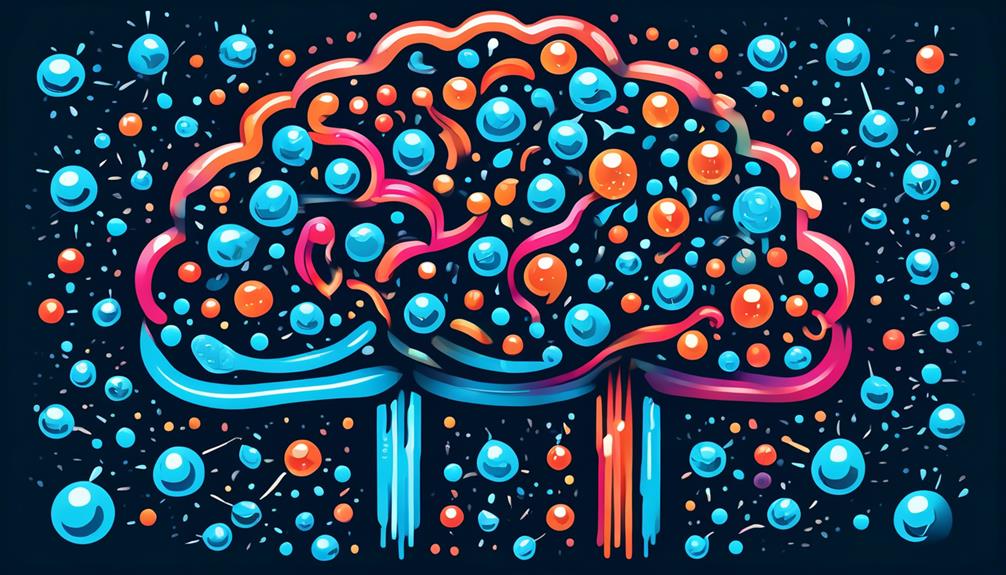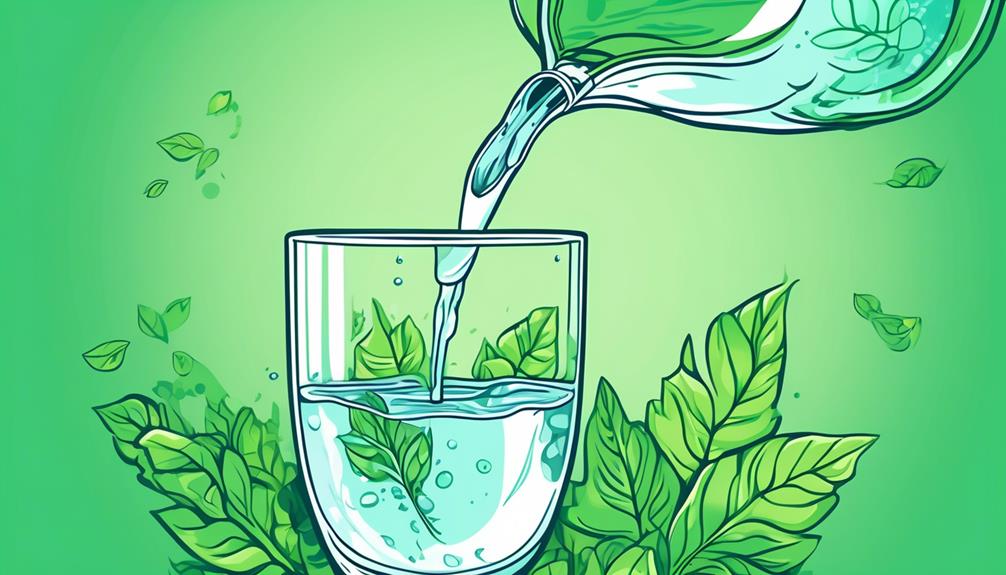Ever wondered about the unsung hero quietly sustaining your body's functions?
Water, often overlooked, plays a critical role in keeping you going each day. From aiding digestion to regulating temperature, water is the silent powerhouse behind many essential bodily processes.
But did you know its influence goes even further?
Let's explore the intricate ways water impacts your health and well-being beyond just quenching your thirst.
Key Takeaways
- Hydration is critical for overall health and well-being, with every cell, tissue, and organ relying on water.
- Water plays an essential role in digestion by aiding in nutrient absorption, enzyme function, and breaking down carbohydrates, proteins, and fats.
- Proper hydration is necessary for transporting essential nutrients in the body, supporting optimal body function and preventing nutrient deficiencies.
- Maintaining hydration levels is crucial for regulating body temperature, supporting brain function, and ensuring efficient metabolic processes.
Importance of Hydration
Staying properly hydrated is crucial for maintaining your overall health and well-being. Your body is made up of about 60% water, and every cell, tissue, and organ relies on water to function correctly. Water helps regulate your body temperature, aids in digestion, flushes out toxins, and lubricates joints.
When you don't drink enough water, your body becomes dehydrated, which can lead to fatigue, headaches, dizziness, and even more severe complications like kidney stones or urinary tract infections. Dehydration can also impact your cognitive function, mood, and physical performance.
To ensure you stay hydrated, aim to drink at least eight 8-ounce glasses of water a day, but your specific needs may vary based on factors like activity level, climate, and overall health. Be mindful of signs of dehydration such as dark urine, dry mouth, or feeling thirsty. Making hydration a priority will help you feel more energized, improve your concentration, and support your body's natural detoxification processes.
Water's Role in Digestion
Ensuring adequate water intake is essential for supporting optimal digestion and nutrient absorption in your body. Water plays a crucial role in breaking down food, aiding in the absorption of nutrients, and the elimination of waste.
When you consume food, water helps in the mechanical breakdown of food particles in your mouth and the lubrication of food to facilitate swallowing. As food travels through your digestive system, water continues to play a vital role in the breakdown of food into smaller components that your body can absorb efficiently.
Moreover, water helps in the proper functioning of enzymes that are essential for digestion. Enzymes that break down carbohydrates, proteins, and fats all require water to function effectively. Without adequate water intake, the digestive process can be compromised, leading to issues like constipation and indigestion.
Water for Nutrient Transport
Water serves a vital role in facilitating the transportation of essential nutrients throughout your body, ensuring efficient delivery to where they're needed for optimal function. When you consume food, water helps dissolve nutrients like carbohydrates, vitamins, and minerals, allowing them to pass through the intestinal walls into the bloodstream. These nutrients are then carried by the bloodstream to various cells and organs that require them to perform their specific functions.
Without an adequate intake of water, this transportation process can be hindered, leading to potential nutrient deficiencies and health issues.
Think of water as the vehicle that carries these essential nutrients to their respective destinations within your body. Just like a well-maintained transportation system ensures goods reach their intended locations promptly, sufficient water intake supports the seamless delivery of nutrients to keep your body functioning at its best. So, remember to stay hydrated to aid in the efficient transport of nutrients and support your overall well-being.
Maintaining Body Temperature
Alright, let's talk about how water helps in maintaining your body temperature.
When you get hot, your body sweats to cool down through evaporation, a key heat dissipation mechanism. Additionally, water aids in regulating your body temperature by absorbing and releasing heat as needed.
Temperature Regulation Process
Playing a crucial role in your body's ability to maintain a stable internal environment, the temperature regulation process is vital for your overall health and well-being. When your body temperature rises, whether due to exercise or a hot environment, your blood vessels dilate, allowing more blood to flow near the skin's surface, releasing heat. You may also sweat, which cools the body as it evaporates.
Conversely, if you're too cold, your blood vessels constrict to reduce blood flow near the skin's surface, conserving heat. Shivering helps generate body heat by expending energy. This intricate process ensures your body stays within a narrow temperature range, optimizing enzyme function and overall metabolic processes for your well-being.
Heat Dissipation Mechanism
Maintaining your body temperature is a complex process that involves a series of mechanisms, including the dilation and constriction of blood vessels and the activation of sweat glands. When your body needs to cool down, it initiates a heat dissipation mechanism to regulate its temperature effectively.
- Sweating: Sweat evaporation on your skin helps dissipate heat.
- Vasodilation: Blood vessels near the skin surface widen to release heat.
- Increased Respiration: Breathing rate may increase to expel heat.
- Heat Transfer: Hot blood moves towards the skin's surface to cool down.
- Regulation by Hypothalamus: Your brain's hypothalamus acts as a thermostat to maintain optimal body temperature.
Impact on Brain Function

Water plays a crucial role in supporting optimal brain function by ensuring proper hydration levels are maintained. Your brain is made up of about 75% water, and even mild dehydration can significantly impact cognitive abilities. When you're not drinking enough water, your brain has to work harder to perform at its best, leading to issues like poor concentration, fatigue, and headaches.
Proper hydration is essential for neurotransmitter function and the production of hormones and enzymes necessary for brain signaling. Water helps to deliver nutrients to the brain and remove toxins, ensuring that your brain operates efficiently. Dehydration can impair short-term memory, focus, and decision-making abilities.
To keep your brain functioning at its peak, remember to drink an adequate amount of water throughout the day. Listen to your body's signals for thirst and aim to consume at least 8-10 cups of water daily. By staying hydrated, you can support your brain in staying sharp, alert, and performing at its best.
Role in Joint Lubrication
Supporting the smooth movement of your joints, water acts as a natural lubricant essential for maintaining flexibility and reducing friction. Hydration plays a crucial role in ensuring your joints function properly and without discomfort.
Here's how water helps in joint lubrication:
- Protects Cartilage: Water helps in maintaining the spongy tissue that cushions your joints, preventing bone-on-bone contact.
- Improves Shock Absorption: Adequate hydration allows for better shock absorption in your joints during physical activities.
- Enhances Synovial Fluid Production: Water is a key component of synovial fluid, which lubricates and nourishes the joints.
- Reduces Inflammation: Proper hydration can help reduce inflammation in the joints, decreasing pain and stiffness.
- Aids in Flexibility: By lubricating the joints, water facilitates smooth movements, enhancing your overall flexibility.
Ensuring you drink enough water daily is essential for keeping your joints healthy and mobile. So, grab that water bottle and take a sip towards better joint lubrication and flexibility.
Detoxification and Waste Removal

Ensuring your joints stay healthy and mobile through proper hydration, your body also relies on water for facilitating detoxification and waste removal processes. Water plays a crucial role in these functions by aiding the kidneys in filtering waste and toxins from your blood to be excreted through urine.
Additionally, water is essential for maintaining regular bowel movements, which helps eliminate waste and toxins from your digestive system.
By staying hydrated, you support the natural detox processes that occur in your liver, allowing it to efficiently break down harmful substances and remove them from your body. Adequate water intake also assists in regulating body temperature through sweating, which is another way your body eliminates waste and toxins.
Incorporating water-rich foods like fruits and vegetables into your diet can further support these detoxification mechanisms. By drinking enough water throughout the day, you help your body function optimally in removing waste products and maintaining overall health. Prioritizing hydration is key to supporting your body's detox processes and waste removal functions.
Frequently Asked Questions
Can Drinking Too Much Water Be Harmful to the Body?
Drinking too much water can actually harm your body. Overhydration can lead to a condition called water intoxication, causing an imbalance in electrolytes. It's important to listen to your body's signals and drink water in moderation.
How Does the Temperature of the Water We Drink Affect Its Benefits to the Body?
Pouring warm water into your body is like a gentle embrace, aiding digestion and soothing your system. It enhances blood flow, promoting relaxation. Cold water, on the other hand, can invigorate and refresh you.
Is It True That Drinking Cold Water Can Help With Weight Loss?
Drinking cold water can aid weight loss by boosting metabolism temporarily. Your body works harder to warm up the cold water, burning a few extra calories. However, it's not a magic solution; a balanced diet and exercise are key.
What Are Some Signs of Dehydration That People Should Be Aware Of?
Feeling thirsty, dry mouth, darker urine, fatigue, and headache are common signs of dehydration. Remember to drink water regularly to stay hydrated and promote overall health. Your body needs water to function properly.
Are There Any Specific Types of Water That Are More Beneficial for the Body Than Others?
Ever wondered if some waters are better for your body? Indeed, natural spring water with minerals can be beneficial for hydration and health. Opt for quality over quantity; your body will thank you.
Conclusion
So, as you can see, water plays a crucial role in keeping our bodies running smoothly. It's like the lifeblood that keeps everything functioning properly, from digestion to brain function to detoxification.
Without enough water, our bodies can't perform at their best.
So, remember to drink up and stay hydrated to keep things flowing like a well-oiled machine!
